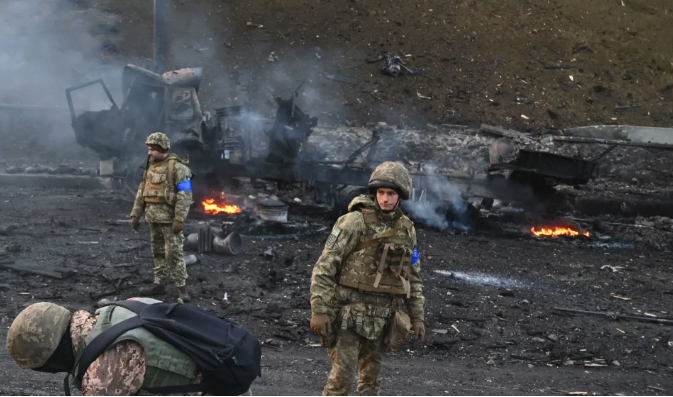
STRATEGIC ASSESSMENT. China, India, South Africa, and several major countries in the Middle East have remained engaged with Russia’s President Vladimir Putin despite his invasion of Ukraine. Some of these governments see the economic and strategic benefits of working with Moscow, while others are eager participants in Putin’s longstanding efforts to weaken the influence of the United States and its NATO allies. Most leaders that have continued to engage Putin calculated that Russia’s larger population and military, coupled with its nuclear arsenal, would inevitably enable Russia to prevail, despite the United States and NATO’s staunch backing of Kyiv. However, the July 24 armed rebellion against Moscow by Yevgeny Prigozhin and his Wagner Group private military force will compel many leaders to seriously doubt the prospects of success for Russia’s war and the stability of Putin’s government. Some governments might change their policies toward Putin’s Russia significantly, whereas others might conclude that their vulnerabilities to worst-case scenarios for Putin are limited and will retain their existing stances.
China has much at stake in the growing instability in Moscow. Despite stated concerns about the Russian attack on Ukraine, President Xi has continued to advertise Russia as a “no limits partner” opposed to the global order dominated by the United States and its European allies. A Russian political collapse would significantly weaken Beijing’s efforts to counter Washington’s global influence. China’s public support for Putin’s handling of the Prigozhin mutiny, which included a visit by Russian Deputy Foreign Minister Andrei Rudenko to Beijing the day after the mutiny ended, underscored Beijing’s nervousness about Russia’s stability. Experts believe Beijing might begin pressuring Putin to end the war in Ukraine, even if on terms unfavorable to Russia. At the same time, China will continue to take advantage of the steep discounts that Russia provides to its remaining oil customers. Beijing will also capitalize on Putin’s weakness to continue to expand China’s influence in Central Asia, which is in Russia’s historic sphere of influence.
India has frustrated its Western partners over its perceived neutrality on the war in Ukraine in international fora. It relies on Russian arms and has taken economic advantage of discounted Russian oil. However, New Delhi has not tilted toward Moscow as markedly as China, and India’s Prime Minister Narendra Modi is therefore not as damaged by association with Putin as is Xi. In addition, as reflected in Modi’s high-profile state visit to Washington in mid-June, India is increasingly engaged with the United States economically and strategically, in large part to counter China. Modi is not likely to view the rebellion as necessitating an abrupt or sharp change in Indian policy toward Russia.
Whereas China and India have better strategic capacity to adapt to any political outcome in Russia, Iran and Syria are watching politics in Moscow with anxiety. Iran has directly aligned itself with Russia’s war effort by selling Moscow sophisticated armed unmanned aerial systems that have been used in Ukraine, further harming its relations with the United States and Europe. Putin’s political collapse or Russia’s outright military defeat in Ukraine would illustrate that Tehran significantly miscalculated in its bet on Russia, potentially energizing the Iranian regime’s regional, international, and domestic opponents. Similarly, direct Russian military intervention in Syria was key to preserving the regime of President Bashar al-Assad, who also is a key ally of Iran. Russian military units and Wagner Group forces remain in Syria to prevent a resurgence of armed opposition activity. The uncertain post-mutiny fate of Wagner Group operations globally, as well as Russia’s military difficulties in Ukraine and political instability in Moscow, threaten to leave Assad bereft of the armed support he counts on to remain in power.
As Saudi Arabia and UAE have expressed doubts about the U.S. commitment to its historic role as guarantor of Gulf security, Saudi de-facto leader Crown Prince Mohammad bin Salman (MBS) and his ally, UAE President Mohammad bin Zayed Al Nahyan (MBZ) have built economic and some security ties with President Putin, despite the invasion of Ukraine. Neither country directly condemned Russia’s invasion of Ukraine, and both have, for the most part, not enforced U.S.-led sanctions on Russia’s economy. The two Gulf states also have frustrated U.S. and European officials by continuing to cooperate with Russia to set policy for the OPEC Plus grouping of major oil exporters. Those interactions have resulted, over the past year, in significant cuts to oil production, running counter to the economic interests of the United States and its allies. The two Gulf leaders undoubtedly recognize that instability in Moscow reduces their leverage with U.S. leaders as Russia becomes a less predictable partner. Both Gulf leaders contacted Putin after the Prigozhin revolt to, according to Russian and Gulf state media, express support for Russia’s stability and security. U.S. leaders have imposed few, if any, costs on MBS and MBZ for cooperating with Putin, and it is unlikely that either leader will break ties with him or begin enforcing U.S.-led sanctions on Russia. On the other hand, the poor performance of Russia’s military in the Ukraine war might forestall any significant discussions with Moscow over purchases of sophisticated Russian weaponry.
Türkiye, which straddles the Middle East and Europe and is a key player in the Eurasian security environment, might also be compelled to reassess its stance on Russia as a result of the Prigozhin mutiny. Although Türkiye is a member of NATO, President Recep Tayyip Erdogan has gained President Putin’s confidence to the point where Putin consulted with him during the Prigozhin rebellion. Notably, Erdogan himself withstood a coup attempt in 2016. Türkiye has frustrated its NATO partners by delaying the accession of Finland to NATO. It has also conditioned approval for Sweden’s membership on Sweden’s extradition of Turkish Kurdish opposition activists that Ankara considers members of terrorist organizations. At the same time, Türkiye has supplied the advanced Bayraktar armed drone to Kyiv, earning plaudits from Washington and its European allies. Erdogan has used his ties to both sides of the Ukraine conflict to promote himself as a broker who not only kept Ukrainian exports flowing through the Black Sea, but one who could also serve as a key mediator to bring an end to the war. Still, the failing Russian war effort and the Prigozhin revolt cast a shadow on Erdogan’s engagement with Putin. It is possible that Erdogan will respond to the Russian instability by shoring up his relations with Washington and other NATO country capitals. One measure he likely will consider is dropping Türkiye’s objections to Sweden’s membership in NATO (TSC).





